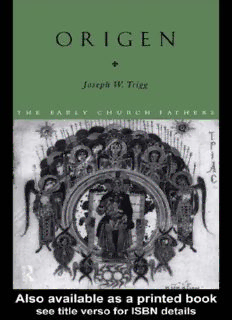
Origen (The Early Church Fathers) PDF
Preview Origen (The Early Church Fathers)
ORIGEN Origen was the greatest and most influential Christian theologian before Augustine – the founder of Biblical study as a serious discipline in the Christian tradition – and a figure with immense influence on the development of Christian spirituality. This volume presents a comprehensive and accessible insight into Origen’s life and writings. An introduction analyzes the principal influences that formed him as a Christian and as a thinker, his emergence as a mature theologian at Alexandria, his work in Caesarea and his controversial legacy. Fresh translations of a representative selection of Origen’s writings, including some never previously available in print, show how Origen provided a lasting framework for Christian theology by finding through study of the Bible a coherent understanding of God’s saving plan. Joseph Trigg is Rector of Christ Church (Episcopal), Port Tobacco Parish, La Plata, Maryland. His books include Origen: the Bible and Philosophy in the Third-century Church (Atlanta 1983) and Biblical Interpretation in the series Message of the Fathers of the Church (Delaware 1988). THE EARLY CHURCH FATHERS Edited by Carol Harrison University of Durham The Greek and Latin Fathers of the Church are central to the creation of Christian doctrine, yet often unapproachable because of the sheer volume of their writings and the relative paucity of accessible translations. This series makes available translations of key selected texts by the major Fathers to all students of the early church. MAXIMUS THE CONFESSOR Andrew Louth IRENAEUS OF LYONS Robert M. Grant Further books in this series will be on Ambrose and Gregory of Nyssa. ORIGEN Joseph W. Trigg London and New York First published 1998 by Routledge 11 New Fetter Lane, London EC4P 4EE This edition published in the Taylor & Francis e-Library, 2002. Simultaneously published in the US and Canada by Routledge 29 West 35th Street, New York, NY 10001 © 1998 Joseph W. Trigg All rights reserved. No part of this book may be reprinted or reproduced or utilized in any form or by any electronic, mechanical, or other means, now known or hereafter invented, including photocopying or recording, or in any information storage or retrieval system, without permission in writing from the publishers. British Library Cataloguing in Publication Data A catalogue record for this book is available from the British Library Library of Congress Cataloging in Publication Data Trigg, Joseph W., 1949– Origen / Joseph W. Trigg. (The early church fathers) Includes bibliographical references and index. 1. Origen 2. Theology – History – Early church, ca. 30–600 – Sources. I. Title. II. Series. BR1720.O7T75 1998 270.1’092–dc21 97-23338 [B] CIP ISBN 0–415–11835–2 (hbk) ISBN 0–415–11836–0 (pbk) ISBN 0-203-01199-6 Master e-book ISBN ISBN 0-203-21202-9 (Glassbook Format) TO ROBERT M. GRANT CONTENTS A note on translations ix Abbreviations xii PART I Introduction 1 1 The making of a scholar and theologian 3 2 The mature years at Alexandria 15 3 Man of the church at Caesarea 36 4 A controversial legacy 62 PART II Texts 67 Commentary on Psalms 1–25, fragment from preface 69 Commentary on Lamentations, selected fragments 73 Commentary on Genesis, fragment from Book 3 86 Commentary on John, Book 1 103 Commentary on John, Book 13.3–192 150 vii CONTENTS Homily 12 on Jeremiah 179 Homilies 19 and 20 on Luke 193 Homily 5 on 1 Samuel 199 Letter to Gregory 210 Commentary on John, Book 32.1–140 214 Commentary on John, Book 32.318–67 233 Notes 241 Bibliographical note 274 Index of Scriptural citations 275 Subject index 287 viii A NOTE ON TRANSLATIONS In the translations below I have tried to provide a readable English text as faithful as possible to Origen’s intentions. In line with the first aim, I have often altered the sentence structure of the original. In line with the second, I have sought to avoid technical terms from later eras. On occasions where a reference to the original Greek wording has seemed helpful, I have included the original (transliterated) in the notes. (This is most often the case with logos, perhaps the most heavily freighted word in the Greek language.) Origen’s work does not lend itself well to being excerpted. Although he often wrote at length, he wrote carefully and sparingly, characteristically accumulating arguments to lead his reader step by step to a logical conclusion. Except in the case of the Commentary on Lamentations, I have therefore presented integral works, or self- contained sections, with no omissions. Triple asterisks indicate gaps in the manuscript tradition. I have sought to make available works that reflect Origen’s entire career, giving roughly equal weight to his Alexandrian and Caesarean periods. I have also sought to present works not previously translated into English or accessible only on expensive or out-of-print editions. These last two considerations militated against including texts from Origen’s best-known works, On First Principles, Contra Celsum, and the occasional treatises, although I cite them generously in part I. The chapter and section numbers (arabic and roman) in my translations and in references to Origen’s works do not come from Origen himself. Like the chapter and verse numbers in the Bible, most of these were added for convenience in reference when these works were edited in the Renaissance. I use those commonly employed in modern editions. Pierre Nautin’s Origène: sa vie et son œuvre provides a comprehensive list of these editions up to 1976.1 The most important addition to Nautin’s list appeared in 1990. Edited by the late Caroline Hammond Bammel, it is the first of a projected ix
Description: